April 14, 2025 | 10:20 GMT +7
April 14, 2025 | 10:20 GMT +7
Hotline: 0913.378.918
April 14, 2025 | 10:20 GMT +7
Hotline: 0913.378.918
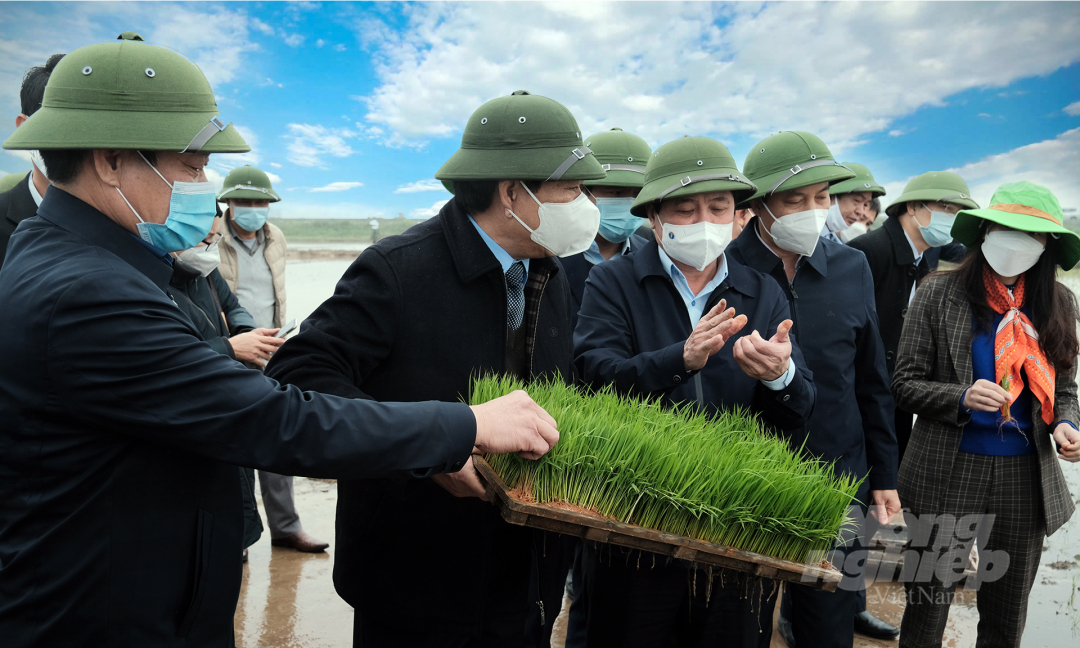
Deputy Minister Le Quoc Doanh visits Dong Hung district, Thai Binh province. Photo: Bao Thang.
In the winter-spring rice crop of 2022, Thai Binh province planned to grow rice on around 75,500 hectares with the high-quality rice varieties making up for 40%-45% of the area. The province targeted the yield will be 71quintals per hectare, 15% of rice cultivation area are under linkages between production and consumption; one or two traditional varieties of high-quality rice will be restored to build Thai Binh rice brand.
During his visit to inspect the preparation for the winter-spring rice crop in the Red River Delta provinces including Thai Binh on February 11, Deputy Minister of the MARD Le Quoc Doanh recognized that Thai Binh farmers actively applied machines and mechanism tr as well as proactively water the fields over the past rice crops. Deputy Minister Le Quoc Doanh said the weather this year is favorable for rice and other crops; the water resource is also abundant for preparing soil and planting rice. According to Mr. Le Quoc Doanh, the localities should focus on water drainage in case of heavy rains that can flood rice and crop growing areas. In addition, the localities should mobilize resources to take advantage of warm and sunny days.
"Through our field trips we saw that a number of advanced transplanting techniques have been introduced to rice growing areas. In the next time we hope that the farmers will use and apply fertilizers and pesticides in a more effective way and finish sowing rice before February 28, 2022," said Deputy Minister Le Quoc Doanh.
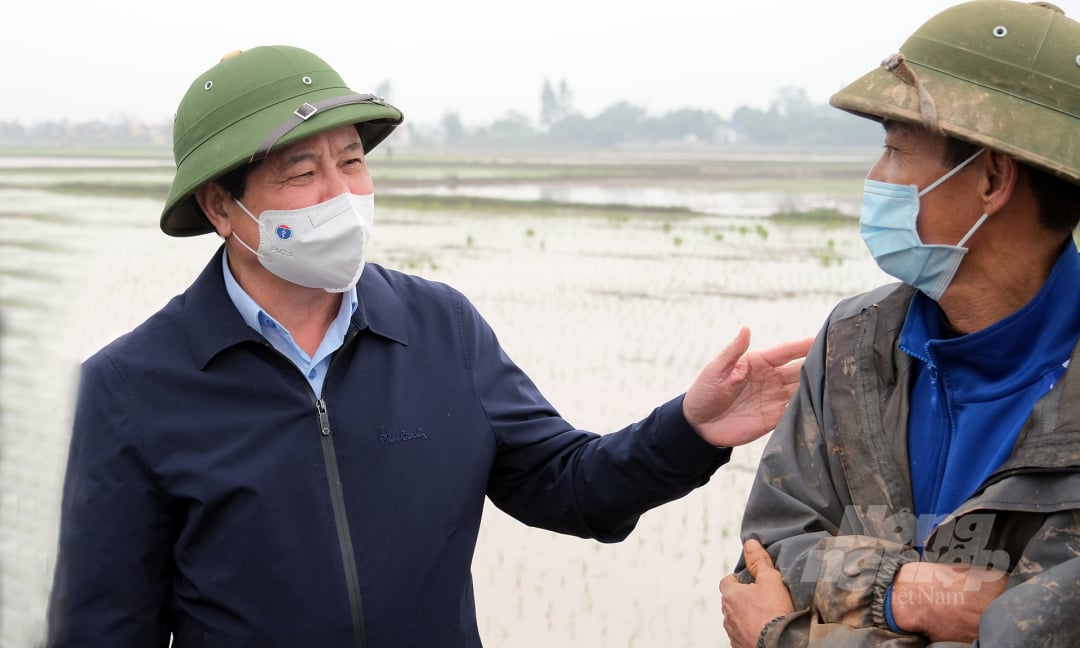
Deputy Minister Le Quoc Doanh visits and encourages Thai Binh farmers on February 11. Photo: Bao Thang.
In his conservation with some farmers in Thai Binh province, Mr. Le Quoc Doanh said the farmers here could save VND50,000-VND70,000 per sao (1 sao = 360 square meters) if they put rice transplanters into use.
However due to the lump of labour on spot many local farmers still make profit by the sale of their own work.
According to the Deputy Minister of the MARD planting rice without transplanting could lead to many consequences. He explained planting seed over the fields used to be said to be a way of saving time and effort while the yields were ensured. However this rice farming method could lead to more use of pesticides and herbicides. Moreover, sowing could easily lead to raising cost of rice seed, especially in cold weather; thereby reducing farmers' profits.
Not only affecting human health and environment, planting rice without transplanting also makes farmers hard to participate in the linkages with enterprises. Pesticide residues can lower the competiveness of rice product in the context of higher market requirements.
"In the past, no one could think that rice could be harvested by machines. But now, that dream has become true in many localities. The area under rice cultivation in the Red River Delta is not too large so the farmers here can completely transplanting rice to have healthier plants and higher yields," Deputy Minister Le Quoc Doanh said.
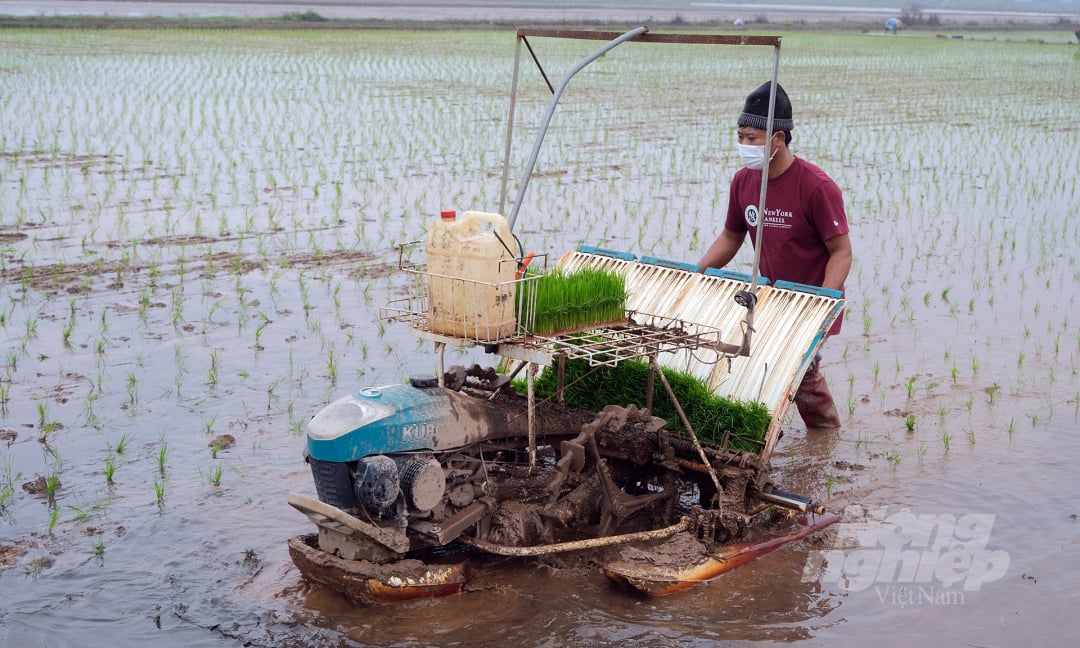
A farmer uses rice transplanter in Dong Tan commune, Dong Hung district, Thai Binh province. Photo: Bao Thang.
Even in the first days of Lunar new year, many farmers in Thai Binh took advantage of good weather to sow rice and prepare the soil to transplant rice in the winter-spring crop. According to Thai Binh' Department of Agriculture and Rural Development, local cooperatives actively guide farmers to grow some rice varieties such as BC15, TBR25, J02 and Thien Uu which are healthy, high-yielding and resistant to pests and diseases.
Apart from propaganda measures to raise people's awareness of the consequences of planting many rice varieties with different growth duration in one crop in order to avoid difficulties in directing, caring and harvesting, Thai Binh's agricultural authority soon took measures on pest and disease prevention and control including yellow snails and rats. Especially, the province's agricultural authority also supported a part of fertilizers to large-scale fields to help farmer feel secure in production.
Currently, Thai Binh province has more than 15,000 hectares of farming land under spring crop. The province has built 3-4 raw material areas to add value to farm produce such as green bean, red peanut and sweet potato, at the same time making use of all land funds to expand the area under cultivation in the summer crop targeting at least 11,000 hectares.
Sharing the joy with Thai Binh farmers, Deputy Minister Le Quoc Doanh noted that the province should study carefully to expand crop-growing area. He also turned the province on to a over 2-million-dollar smart agriculture project that is being carried out by Vietnam Academy of Agricultural Sciences in collaboration with the Korean Funds for Technology Transfer in Vinh Quynh commune, Thanh Tri district, Hanoi city.
Translated by Mai Tham

(VAN) According to Deputy Prime Minister Bui Thanh Son, through this P4G Summit, Vietnam aims to convey the message of transforming its growth model towards rapid and sustainable development.
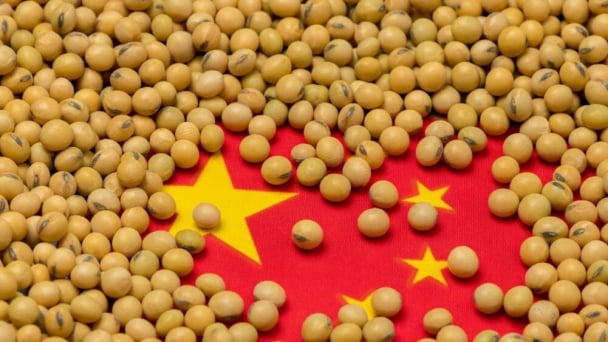
(VAN) Soybean production has been a priority for China to ensure food security, with increased soybean cultivation and yields highlighted in the annual No. 1 Central document.
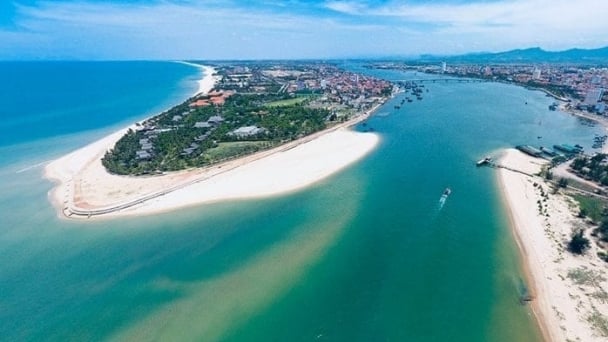
(VAN) Vietnam Sea and Islands Week 2025 is expected to take place in Quang Binh, featuring a series of meaningful activities aimed at protecting the ocean through green technology solutions.
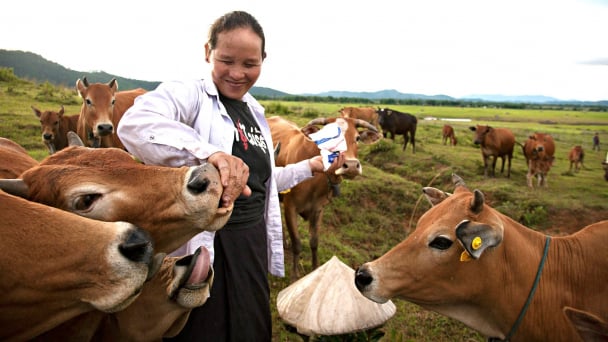
(VAN) The One Health approach is no longer merely an option, as increasingly complex challenges confront health and food systems.
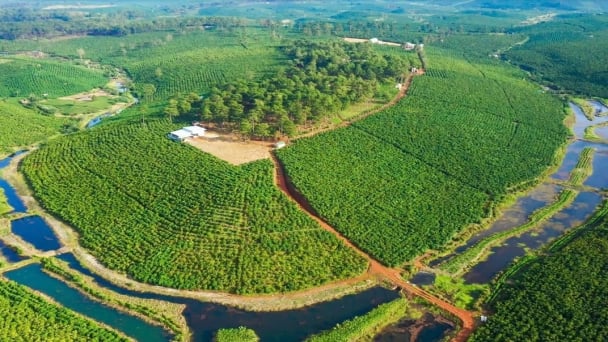
(VAN) The project promoting sustainable coffee production, with a focus on waste management and raising farmers’ awareness, has achieved many positive results after nearly two years of implementation.

(VAN) Transferring and receiving 6 individuals of the red-crowned crane from Thailand to Vietnam marks a significant milestone in the conservation efforts for this species.

(VAN) After more than a year of implementation, the One Million Hectares of High-Quality, Low-Emission Rice project has completed the first steps, but it needs breakthrough solutions to deepen impacts in the upcoming phase.